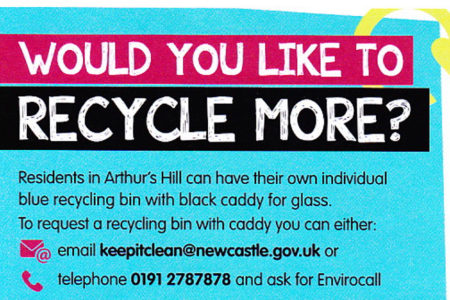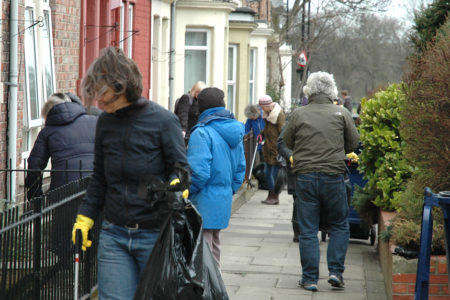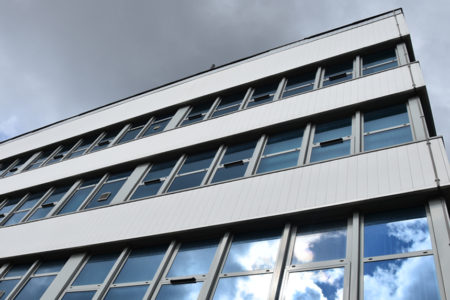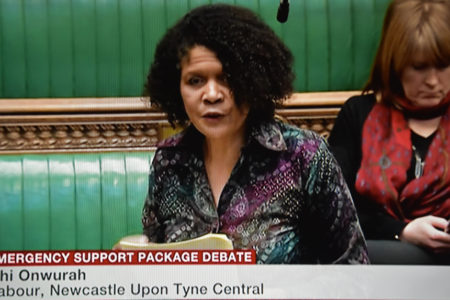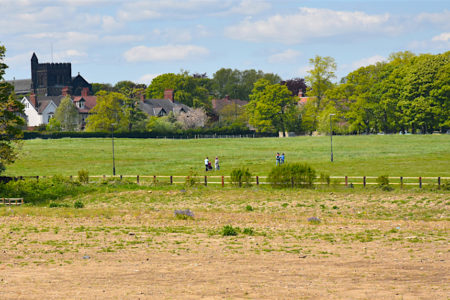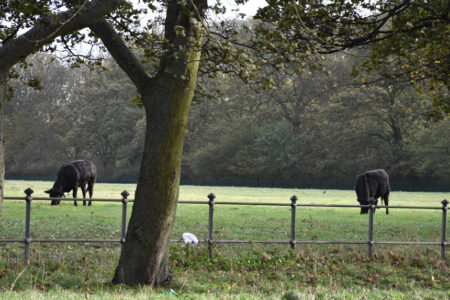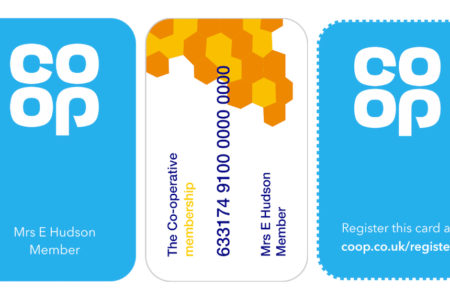News Archive
Spring into May
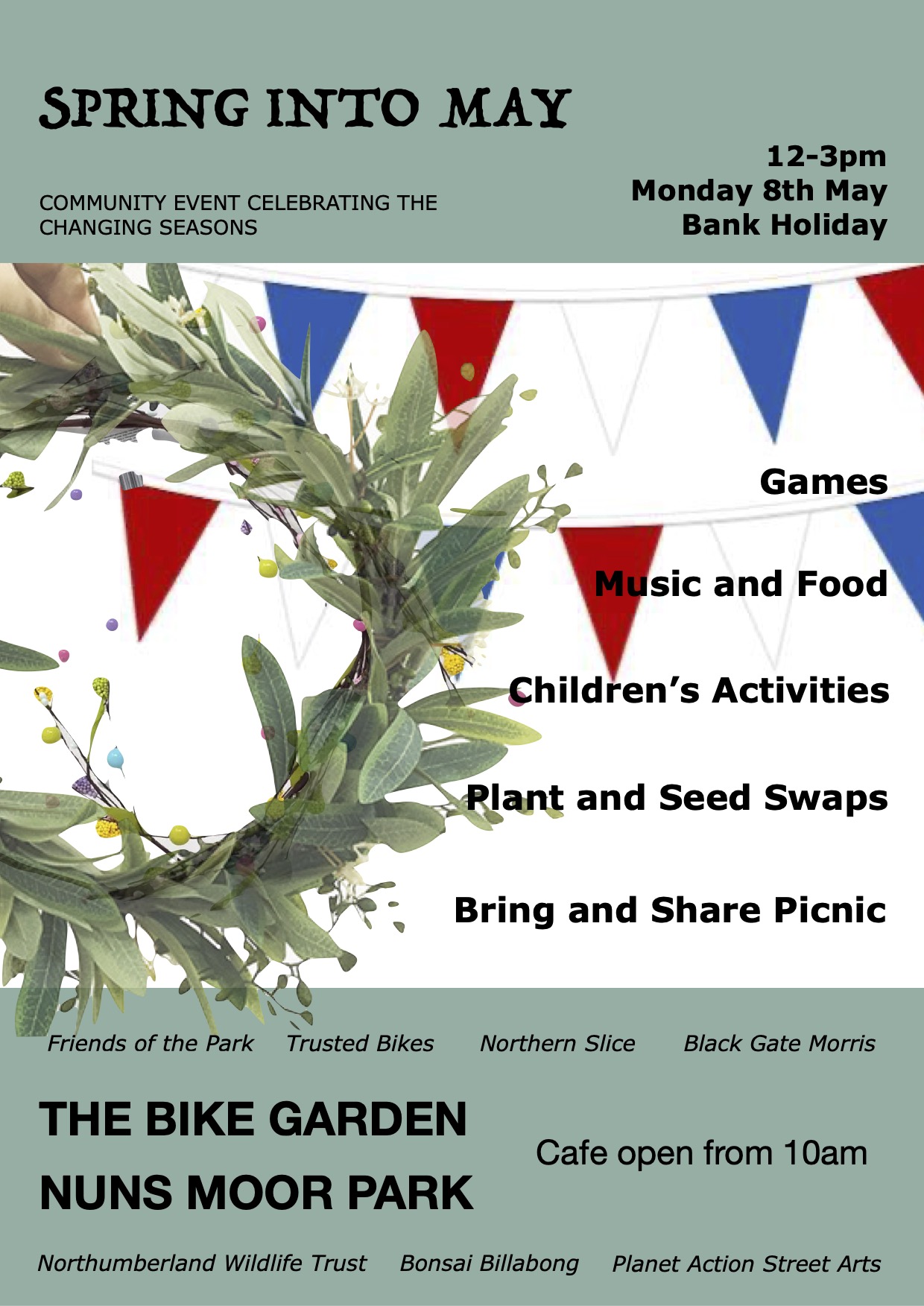
SEED AND PLANT SWAPS
On Monday 8th May between 12pm – 3pm our Spring into May bank holiday event will celebrate the changing seasons. Please bring plants and seeds to swap or something for the food share. Brunch 23 are sharing a pan of Biryani and Aneesa’s restaurant have donated a £50 voucher for the raffle. There’ll be music and games, bike maintenance and tree planting advice and sales. Of course you can come for a coffee and just soak up the atmosphere if you want. Black Gate Morris will be joining us. We’ll have pizzas, space for the kids to run around, friendly faces and a bit of chat. We’d love to see you either way.
One of our activities will be to make planters for the backstreets. We have a special planter task this summer – if you’ve got making skills, access to soil or a hammer and nails, we need you! Many hands…
If you have other ideas or skills you’d like to share, please get in touch: hello@greeningwingrove.org.uk with ‘MAY’ in the subject line.
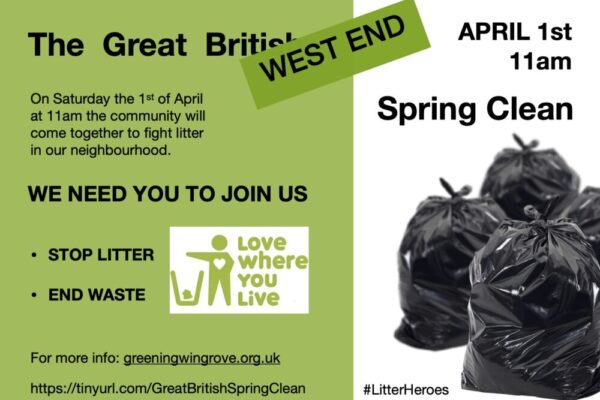
The Great West End Spring Clean
Hello, we are your neighbours. Many of us have lived here for a long time and we LOVE living here! It’s a vibrant community with people from many different cultures. There is so much to learn here and so much to love. One of the things I especially love is walking down the street and smelling the wonderful cooking smells coming from houses at meal times.
However, we do have some challenges here, one of them being the amount of rubbish on our streets. The problem seems to be getting worse and it’s now attracting rats! So what can we do? Well we think we all have to acknowledge that many of us feel the same way about this problem. It’s no good thinking others will solve the problem for us and it really is down to us to change things.
We’d like to invite you all to join us to make this a cleaner, greener, and safer place to live. We believe that there are more of us care than those that don’t. Let’s all revel in our collective strength and show that we love where we live!
On Saturday the 1st of April at 11am were inviting you, our community, to come together to fight litter in our neighbourhood. We hope that you, your family, the people that you work with, will all pledge to join us to remove at least 1 bag of rubbish from your street. Come to the Bike Garden at 10am to get some bin bags, gloves and litter pickers or look out for us on the street and do your bit to help by cleaning your area. The weather report says its going to be miserable and rainy that day but this won’t stop us. We hope it won’t stop you either!
Please take care when litter picking.
ALWAYS WEAR HEAVY DUTY PROTECTIVE GLOVES
COVER ANY CUTS HOWEVER MINOR WITH SURGICAL TAPE / WATERPROOF PLASTER
KEEP HANDS AWAY FROM MOUTH AND EYES WHEN LITTER PICKING
WASH HANDS AND FOREARMS BEFORE EATING, DRINKING, SMOKING OR GOING TO THE TOILET
DO NOT PICK UP DANGEROUS, POISONOUS OR HAZARDOUS ITEMS.
This event is part of the Great British Spring Clean organised by Keep Britain Tidy Campaign. The Great British Spring Clean and Great Big School Clean 2023. This is the 8th year of the campaign.
You or your group, or your school can make the litter pledge here.
https://www.keepbritaintidy.org/get-involved/support-our-campaigns/great-british-spring-clean/

Passionate To The End
Nigel Todd
1948-2021
Nigel Todd, co-founder and chair of Greening Wingrove & Arthur’s Hill, passed away unexpectedly but peacefully at his Croydon Road home on Saturday 27 March, aged 73.
A well-known figure locally, the constantly active Nigel was preparing for re-election to the City Council in May, having already served as a West End Labour (& Cooperative Party) councillor for 41 years, most recently for the newly created Arthur’s Hill ward.
His zeal for Arthur’s Hill and Wingrove was evident, not only through his campaigning work but through his lifestyle choices. He had lived in the area for 30 years, describing it as “a great place”, which “we could make better’. He believed fervently in the “wacky” idea of turning our neighbourhood into “a sustainable inner-city garden suburb”.
He campaigned tirelessly and helped found Greening Wingrove as a ‘green’ response to the rubbish and fly-tipping beginning to blight our area.
It generated more than £1m income for Wingrove and Arthur’s Hill and has supported community engagement in local issues such as growing fruit and vegetables in our backyards, initiatives to encourage and retain wildlife, schools education, recycling and improving the appearance of our streets and back lanes. Neither would he be afraid to get his hands dirty and would regularly be seen on the community litter picks he helped set up.
He was especially active during the pandemic, working tirelessly to sustain community creativity and resilience, all in a Covid-secure manner.
He encouraged the development of the Bike Garden in Nuns Moor park, a meeting and activity space centred around a community garden, developed from a disused bowling green and pavilion.
His active interest in local matters, led to him opposing the destruction of the 126-year-old Nuns Moor allotments on Brighton Grove to make way for cattle grazing, accusing the city’s Freemen of doing a u-turn on a promise to restore a smaller allotment site.
He worked more successfully with them as one of the council’s Town Moor Committee and helped pave the way for a part of the land on Barrack Road to be used for cricket matches for Bengali youth.
He chaired the New Deal for Communities initiative, which brought millions of pounds of regeneration funding into the West End over a ten-year period 2000-2010. He also actively supported the work of the Nunsmoor Centre on Studley Terrace
Having come from a humble background, but offered educational opportunities through the prestigious trade union Ruskin College (which he credited with transforming his life), Nigel spent most of his working years in the adult education sector and remained a passionate advocate to the end.
He helped found the North East Open College Network and was appointed as its first chief executive in 2000. He had a longstanding commitment to the Worker’s Educational Association (WEA) as a volunteer, student, tutor, historian and Regional Director.
He was quoted approvingly in the House of Lords earlier this month in a special debate on the future of adult education, when one of its members relied on Nigel’s explanations of the value of adult learning.
He was a keen advocate of co-ops and his own home was rented through the West End Housing Co-operative. He served as chair of the Co-operative College board which in 2019 with the WEA and Oxford University launched the #AdultEducation100 campaign, setting out a vision for lifelong adult education for the century ahead. He was also chair of the Newcastle Fairtrade Partnership.
His other enthusiasm was the North East and its history. Although not a native, he settled in Newcastle in his late 20s and remained here ever since. He was respected as a local historian and in demand on the local speaker circuit. He was the author of several book and pamphlets, numerous articles, and was an active member of the North East Labour History Society. He was recognised nationally as an expert on the rise of fascism in the UK in the years leading up to the Second World War and remained a staunch enemy of racism throughout his life.
FAMILY REQUEST
He leaves behind a daughter, Selina, his close family and hundreds of people who have been touched by his generosity of spirit and passionate belief in equality of opportunity for all.
His family has asked for a private funeral and expressed a desire to hold a more public remembrance when circumstances allow larger gatherings, this being in chime with Nigel’s views on Covid safety.
Tributes have poured in …
“I am devastated to hear about the death of my friend and colleague, Nigel Todd. He was widely known, and hugely popular, across the West End of the City; everywhere he went people would stop, say hello, and ask him for advice or help.” He “never lost faith in his vision of a better world, never had an unkind word about anyone and always had a friendly smile”. Newcastle City Council leader Cllr Nick Forbes.
“Deeply saddened and distressed to learn of the sudden death of my great friend & comrade Nigel Todd. Nigel was a socialist who truly loved people & communities, championing their interest & working with people & for them so that they could make their lives better.” Chi Onwurah, Newcastle Central MP
“All at Co-operatives UK are very saddened to hear that Nigel Todd passed away yesterday. A passionate co-operator – including as chair of trustees for the Co-operative College – our thoughts are with his family, friends and colleagues at this incredibly difficult time.” Co-operatives UK
He was “a keen advocate for co-operation, equality and peace. He dedicated his life to tackling poverty, racism and inequality – and was passionate about life-long learning.” Rebecca Harvey, Co-op News
“Nigel was a shining beacon for kind, caring politics. He was a true community leader, representing the residents of Arthur’s Hill and Newcastle with passion and compassion, bringing people together, and fighting for fairness and peace.” Alistair Ford & Taymar Pitman, Newcastle Green Party.
“We are deeply saddened and shocked to hear of the passing of Cllr Nigel Todd. Nigel was a well respected representative of the local community who cared passionately about tackling poverty and inequality and championing lifelong learning. Members of our party speak highly of his anti-racism work.” Cllr Nick Cott, leader Newcastle Liberal Democrats.
“Really saddened to hear this news. Nigel was a very lovely person and a very passionate and knowledgeable co-operator. We will be much missed by his many friends across our team and our Party.” Joe Fortune, general secretary the Co-operative Party.
“His knowledge and passion for adult education (and the North East) and pioneering work in supporting environmental agenda are just the tip of the legacy he leaves behind. Our thoughts are with his family.” WEA
“Truly tragic news about the sudden and unexpected death of Cllr Nigel Todd. He was a genuinely lovely man, with real passion for transforming his community for the better. He will be missed by all who knew him and leaves an enormous hole in the co-op sector.” Nicola Huckerby
LEAVE YOUR THOUGHTS
We intend to publish a lengthier tribute to Nigel and his work in a few weeks time. If you have anything you wish to contribute please email to hello@greeningwingrove.org.uk
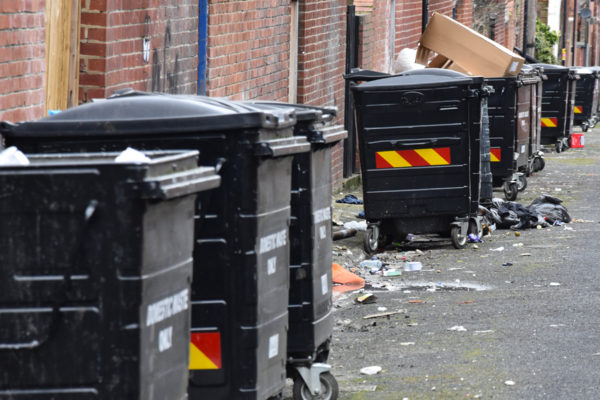
Back Lanes Litter Meeting
Arthur’s Hill councillors have called a public meeting to discuss ‘waste and recycling issues’ in the area.
In a joint letter, councillors say the area continues to face challenges and have called on Arthur’s Hill residents to let them know “what more we can do together to solve these long-standing problems”.
“Although the communal bins have generally improved the cleanliness of our back lanes”, they say, “there are still some grot spots, a lot of fly tipping and a minority of residents who dump rubbish on the ground rather than finding a bin”.
A video meeting (open to all Arthur’s Hill ward residents) will take place on Zoom on Tuesday 9 March, 6pm. If you want to attend you will need to register before the meeting to get the videolink to take part. Register here.
Those unable to attend, or who prefer to put their thoughts and ideas in writing, can email Cllr Nick Forbes, who has promised to raise issues with the City Council. “This can be about specific issues or problems you experience on a regular basis, or about any ideas you have for ensuring everyone follows the rules about waste disposal and recycling”.
GH
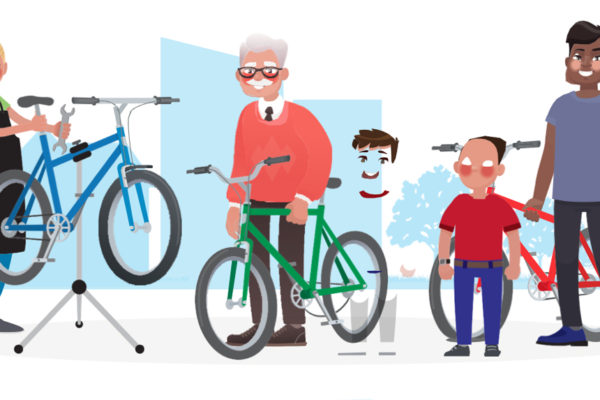
Dr Bike Is Back
The popular Dr Bike cycle maintenance scheme has returned to Nuns Moor Park in Arthur’s Hill, after a successful run last year getting local people to cycle more by making sure their bikes are safe to use.
Every Saturday until the end of March, Dr Bike will be on hand to help local residents get their cycles roadworthy and safe for Spring.
You can bring your bike to the park and it will be given a comprehensive safety check, with minor adjustments and repairs done for free.
You need to book an appointment in advance. You can text ‘DR BIKE INFO’ to 07 385 634 825, or email drbikeappointments@gmail.com, or go to the Trusted Bikes Facebook page.
The Saturday sessions run from 10am to 3pm until the end of March.
The scheme is a partnership between Greening Wingrove CIC, Autismable CIC and Trusted Bikes CIC.
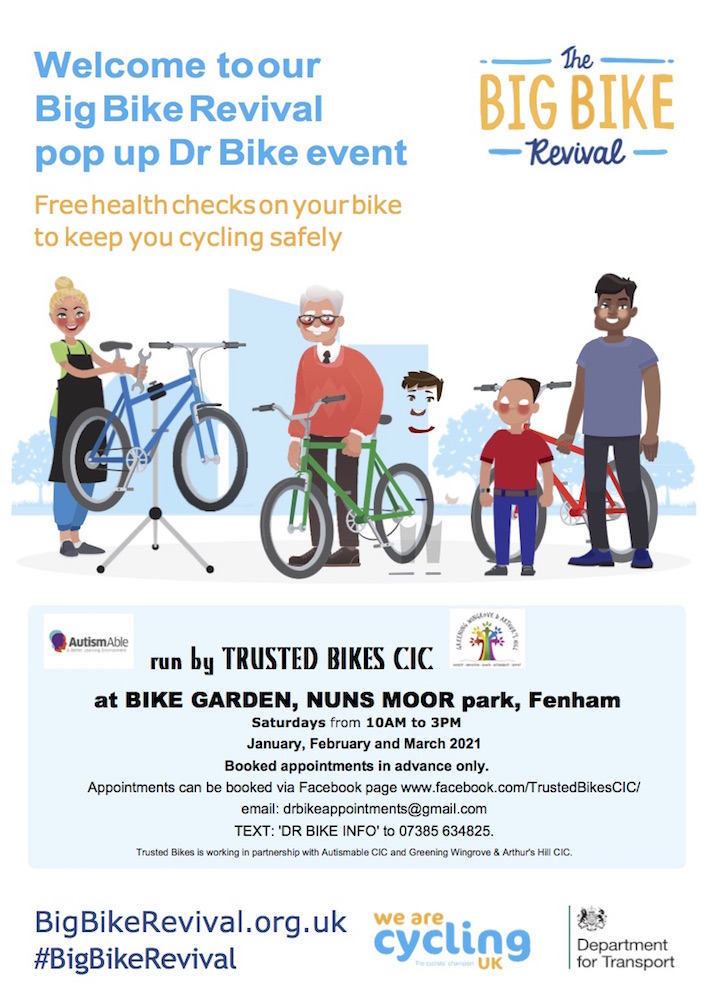

Help Improve Our Area
We are looking for local people living in Wingrove or Arthur’s Hill wards to join our board and play a part in making our area a better place to live in.
Anyone aged 16 or over can become a director and sit on the board, “a friendly group” which meets once a month to oversee and lead the work we do in our neighbourhoods.
“We’re particularly anxious to encourage nominations from among women and residents from black and minority ethnic backgrounds”.
“Women and residents from black and minority ethnic backgrounds are currently under-represented on the CIC Board and we’d like to put that right”.
It is easy to join. Just fill in a simple nomination form here. The form should be returned to hello@greeningwingrove.org.uk
If anyone wishes to check their membership status, or have a chat about the board role, please e-mail hello@greeningwingrove.org.uk
All CIC Members are welcome stand for election to the Board and vote, but the meeting is also open to friends of Greening Wingrove and Arthur’s Hill as well.
The AGM will receive the Board’s report on our activities from the previous year, as well as the annual accounts.
NT
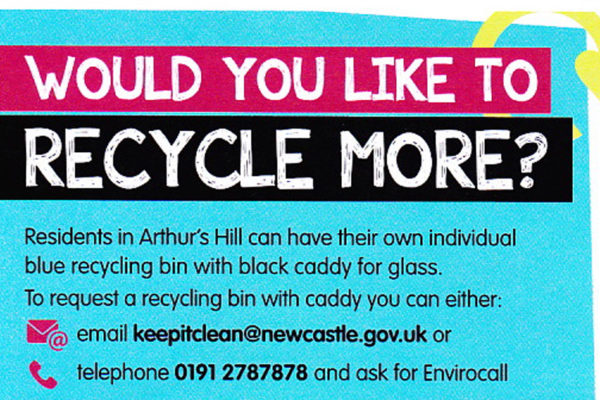
Recycling Love Returning?
Arthur’s Hill residents have until Valentine’s Day to order free personal recycling bins for their household.
Leaflets advising of the new scheme went out to all residents in January, in response to pressure from Greening Wingrove & Arthur’s Hill, says chair Nigel Todd, also a local city councillor.
Recycling in the area ‘collapsed’ in Wingrove and Arthur’s Hill after recycling provision was withdrawn, says Nigel.
The collapse follows the abolition of the traditional household green and blue weekly collection system and its replacement by so-called ‘communal bins’, which remain in back lanes all the time and do not prioritise recycling.
“We suggested to the City Council that they return blue recycling bins to households that wanted to recycle domestic waste. This was agreed, and the quality of recycling greatly improved. Greening Wingrove & Arthur’s Hill felt that there was scope to bring more residents in the terraces into the recycling scheme. The Council has now responded with an invitation to residents to apply for blue bins.”
Residents will be expected to keep the bins safe in a yard or garage, apart from on bin collection day.
The City Council is offering recycling bins to all households in Arthur’s Hill ward, but residents must register their details by Sunday 14 February to take advantage.
Residents should email their name and full postal address to keepitclean@newcastle.gov.uk or telephone 0191 278 7878 and ask for ‘Envirocall’.
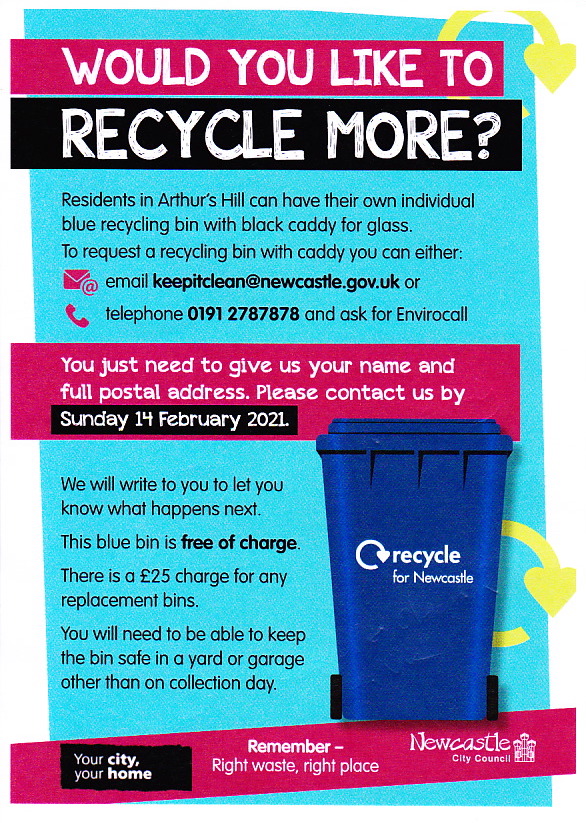
GWAH Calls For Meeting With Council
We are calling for more discussion with the Council about how we tackle waste issues in our neighbourhoods.
“We’ve been very concerned, to say the least, about the fly tipping, overflowing bins and mess in the back lanes of the terraced streets off Wingrove Road and in Arthur’s Hill’ says Nigel.
“For some time we’ve been seeking a further meeting with the City Council to find ways of reducing the problems. It’s now likely that the Council will host an on-line community meeting about litter and waste in early March, and chaired by the Leader of the Council (Arthur’s Hill councillor Nick Forbes). This will be primarily for residents of the terraces, but there are other ‘hotspots’ that could feature in the meeting.
“We’ll publish more details when these are available. But if you’d like to register an interest in attending and having your say, then do contact us: gw.bikegarden@gmail.com
GH
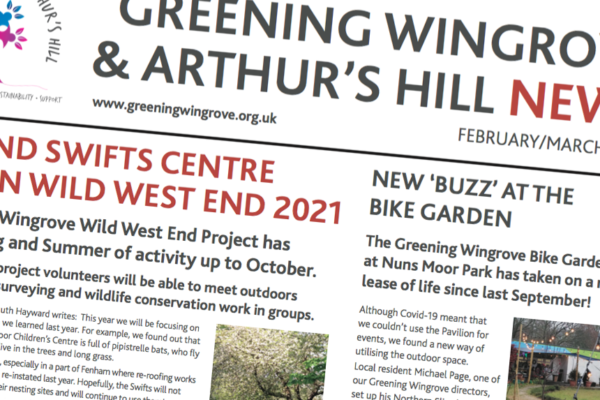
Our Latest Newsletter
You can now get your copy of our latest newsletter online.
Our February/March 2021 edition includes updates on the following activities we support.
- The Bike Garden in Nuns Moor Park
- The return of Vertical Veg and our Growing Green Communities initiative
- Wild West End plans for Spring and Summer
- Covid-19 Mutual Aid
- Helping hedgehogs
- Our Northumberland wildflower seed giveaways
If you want get involved in any our work, there’s also details of how to get in touch.
Download your copy here today.
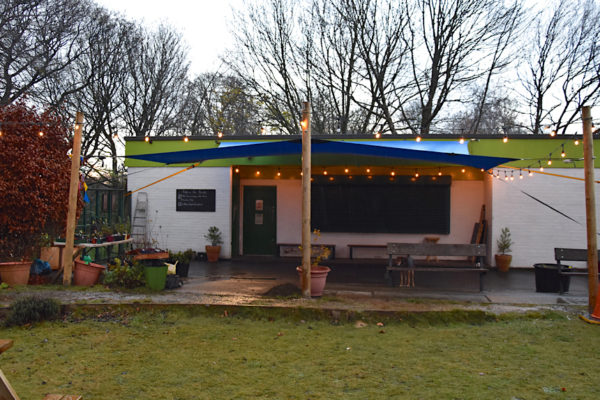
Take Our Survey
Greening Wingrove Community Interest Company is looking to build upon existing ways and develop new ways of generating income aimed at supporting all of its valuable community work; focused on making Wingrove and Arthur’s Hill an environmentally sustainable place to live.
To help it achieve that goal a key component involves the further development of the Bike Garden as a multi-use/purpose functional community space to be utilised by residents and organisations to provide services people want and need.
To help Greening Wingrove offer the right activities, services and opportunities we are looking to you, as identified stakeholders, to help shape that offer by completing our short survey
The completed survey should be returned to h.c.horizons@outlook.com
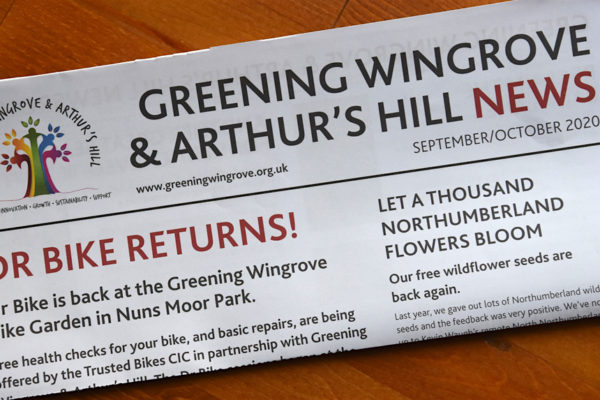
Our Latest Newsletter
Have you seen our latest newsletter?
In case you’ve not received your copy through the door yet, you can read your local ‘Greening Wingrove & Arthur’s Hill News’ here.
Contains latest news about our free bike health check sessions, free wildflower seed giveaway, plans for the future of the Bike Garden at Nuns Moor Park, reclaiming our back lanes, Vertical Veg, Wild West End, Covid-19 Mutual Aid, flytipping and litter and our opposition to plans for a Burger King at the former police station site on Westgate Road. It also has details on how you can contact us and how you can support our work.
GREENINGWINGROVE 165613 A3 newsletter SEPT 2020
Past Views


